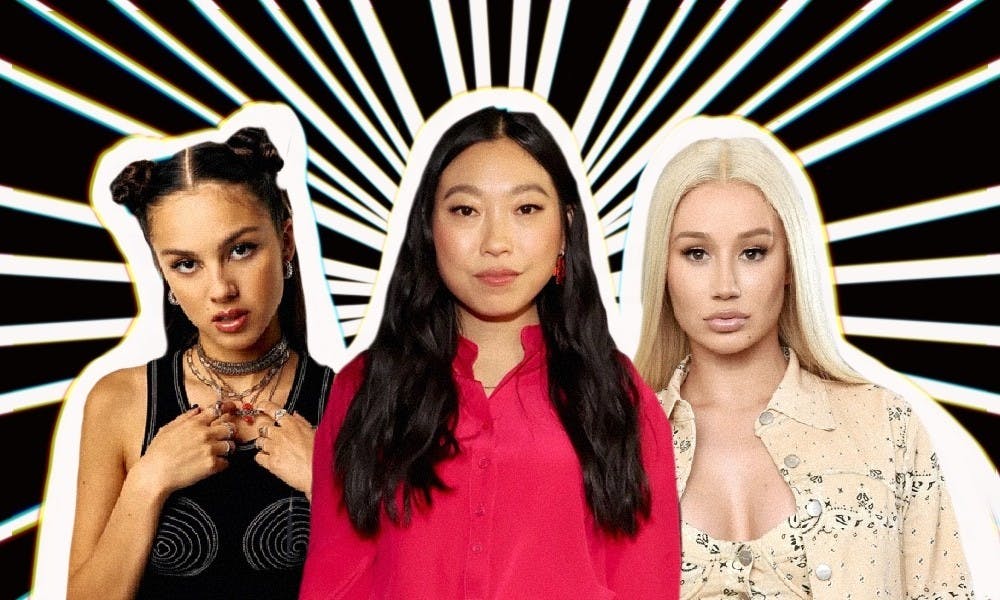Recently, the music industry has been consumed by controversy, from streaming services to the ownership of music from artists' catalogs. Artists have been extremely vocal on this topic, rushing to each others' defense and sometimes talking over one another just to be a part of the conversation. But what do these musicians have to say about the voice of music itself—is it possible to own language?
Earlier this month, actress and rapper Awkwafina took to Twitter to address accusations of appropriating African American Vernacular English (AAVE) in her work, which have been building since the early days of her career. On the topic of language appropriation, most artists simply don’t say enough, especially those who are perpetuating the problem. The problem didn’t start with Awkwafina. Olivia Rodrigo, Ariana Grande, and Iggy Azalea have all been accused of using AAVE in their music or social media personas. Awkwafina attributed her use of AAVE to the “American identity” she created for herself as an immigrant based on the music she listened to and TV shows she watched. On the other hand, Azalea questioned why it was “such a big deal” to appropriate another culture’s language in her music.
It’s dubious at best to take Awkwafina’s assertions about her identity at face value. Although Awkwafina is the star of the dramatic film The Farewell, her use of AAVE is notably absent. By claiming AAVE as part of her American identity in comedy and dropping this voice completely in more somber work, Awkwafina dismisses decades of culture and struggle attached to the dialect. For her, the ramifications were as superficial as an impulsive non–apology and the announcement that she was quitting “the ingrown toenail that is Twitter,” as if Twitter made her appropriate another culture’s language in numerous projects across several years. Similarly, in formal interviews, Azalea’s speech is marked by her native Australian accent rather than the voice she puts on when she performs. And Rodrigo’s use of AAVE certainly fell away when she spoke before President Biden.
Non–Black artists have the privilege to use voice and speech as a medium that they can change based on context. Black people face significant consequences for speaking the same language that white people arbitrarily decide to use when it suits their image. Despite having rules governing grammar and inflection like any other language, AAVE—and consequently its Black speakers—is consistently discredited as linguistically inferior. The ramifications can sometimes be tragic, like when jury members in the 2012 shooting of Trayvon Martin discredited a key witness' testimony because she was speaking AAVE.
AAVE has complex origins and is often spoken by the descendants of enslaved Africans in the United States as well as Black immigrants. It is a constantly evolving language, making it a meditation on the past as well as a reflection of the current moment. However, this has also encouraged many to adopt and exploit it for their own use, especially given the ubiquity of AAVE on the internet and within Gen Z culture. In a 1979 op–ed for the New York Times, James Baldwin wrote, “I do not know what white Americans would sound like if there had never been any black people in the United States, but they would not sound the way they sound.” Today, this sentiment feels truer than ever. So much of Gen Z language originates in AAVE slang, something many aren’t even aware of.
The discussion of whether it is possible or reasonable to restrict the use of language to a certain group is a rather nebulous one, but it's clear the topic carries some weighty implications. Many phrases originating in Black culture are rapidly becoming inextricable from wider pop culture, a trend it would be nearly impossible to reverse, given the pervasiveness of hip–hop or TikTok in today's society. But that doesn’t mean artists like Awkwafina or Olivia Rodrigo can just shrug their shoulders and look the other way to avoid being involved. These Gen Z icons have countless followers on TikTok, and they should be using that platform to display a willingness to engage with questions of language and appropriation, not to promote close–mindedness and evasion.
Their engagement shouldn't be a one–sided monologue drafted in the Notes app, but rather a demonstration of active listening and learning which will prompt people to start reevaluating how these questions fit into their own lives. The more the conversation becomes a part of societal consciousness, systemic change can follow, and it’s up to those with the ear of our generation to say the first word.

